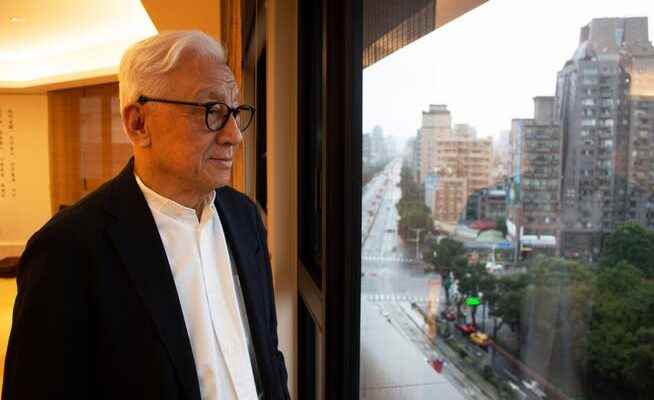Taiwanese billionaire Robert Tsao made his fortune in the chip industry, whose rise is closely linked to China. Now he is committed to making Taiwan defensive against China.
From his apartment, Robert Tsao looks out over Daan Park in the center of the Taiwanese capital, Taipei. He wants to preserve Taiwan’s independence and uses his wealth to do so.
A CV like Robert Tsao’s is called “blue” in Taiwan. Blue is the color of one of the two major camps in Taiwanese politics. Blue represents the Kuomintang (KMT), which ruled Taiwan autocratically for decades and is now in opposition. She is generally friendly towards mainland China. On the other hand, there is the green camp of President Tsai Ing-wen and her DPP, which is critical of China.
Tsao, 75, was born in Beijing and came to Taiwan as a toddler. His father, a teacher, was assigned to teach Chinese to the local population, who had just been released from fifty years of Japanese colonial rule. Tsao became a successful businessman and founded United Microelectronics Corporation (UMC), now one of Taiwan’s largest chip manufacturers. Tsao has not been active at UMC for more than fifteen years. Through his entrepreneurial activities, he became one of the richest men in Taiwan.
The rise of Taiwan’s chip industry is closely linked to the economic development of the People’s Republic. UMC made its first connections to the mainland at a time when the Taiwanese government was still trying to prevent it. Tsao therefore had to answer in court, but was acquitted. Despite this, the businessman was so upset that he renounced his Taiwanese citizenship and became a Singaporean.
$100 million against China
“Many of my friends thought I was very ‘blue’, that I was in favor of uniting Taiwan with mainland China,” says Tsao, when asked about his CV, “but they misjudged me.” How wrong that became apparent at the beginning of September, when Tsao announced several donations totaling 3 billion Taiwanese dollars, a good 90 million francs.
Tsao’s donations, for example, go to the Taiwanese army and enable the training of 300,000 snipers. In addition, the billionaire supports the Kuma Academy, which tries to strengthen the will of the Taiwanese to defend themselves.
The Kuma Academy highlights the danger of misinformation from the mainland and argues that Taiwan can successfully defend itself. First aid is part of the courses, which are booked out for weeks, so that the population can help themselves in the event of war. The goal is for at least one person to be trained in one third of Taiwanese households.
Because in order to preserve Taiwan’s independence and defend the island from Beijing, one thing is particularly important, says Tsao: “Taiwan people have to identify with Taiwan and not with China.” Polls show that almost two-thirds of the population consider themselves Taiwanese, with just a few percent still feeling Chinese.
Tsao wants Taiwanese to be willing to fight for their democracy and their freedom. He quotes former American President John F. Kennedy: “The price of freedom is always high. But the Americans always paid him. We will never choose the path of surrender and submission.” Taiwan must also be prepared to pay this price, says Tsao with determination.
Beijing’s behavior in Hong Kong shaped Tsao
There is a trigger for Tsao openly opposing Beijing with the power of his wealth. Tsao was living in the city during the Hong Kong demonstrations in the spring and summer of 2019. On July 21, at the Yuan Long subway station, thugs attacked people who had taken part in the demonstrations. Despite numerous calls, the police did not intervene.
Tsao is convinced that the thugs were acting on behalf of Beijing. “I got so angry,” Tsao recalls, “how can you do something like that in a city like Hong Kong in the 21st century?” Tsao decided to leave Hong Kong forever, moved back to Taiwan. And he took Taiwan citizenship again. Since then, he has lived again in central Taipei with a sweeping view of central Daan Park.
Tsao says of himself that he was always critical of the communists on the mainland: “The communists have relied on violence and deception from the beginning.” To make his point, Tsao stands and purposefully pulls out a book from his extensive bookcase. It is about land reform in China in the late 1940s, early 1950s. Instead of distributing the land from large landowners to peasants in accordance with laws, the communists tortured and murdered. And the farmers who were promised the land got nothing after all. Tsao pauses and concludes: “The communists don’t keep any promises.”
Then why did he do business in China if he knew this? Tsao justifies his earlier engagement by saying that for a while in the early 2000s, it looked like China would reform, become a normal country.
Beijing’s actions in Hong Kong have made it clear to Tsao that it has nothing to offer the Taiwanese people. As a businessman, he used to argue that Beijing should make an offer, like a friendly takeover, for the Taiwanese to vote on. «But the offer has to be honest, the buyer has to stick to the agreement afterwards. With Hong Kong, Beijing has shown that it is not willing to do this.”
This means that the “one country, two systems” option is off the table. The only alternative left is hostile takeover. That’s what many in Taiwan think. But Tsao doesn’t want to put up with it. Taiwan must fight. When he slips into the role of leader at the age of 75, he comments with a laugh: “I’m the grandpa who wakes the boys up.”
